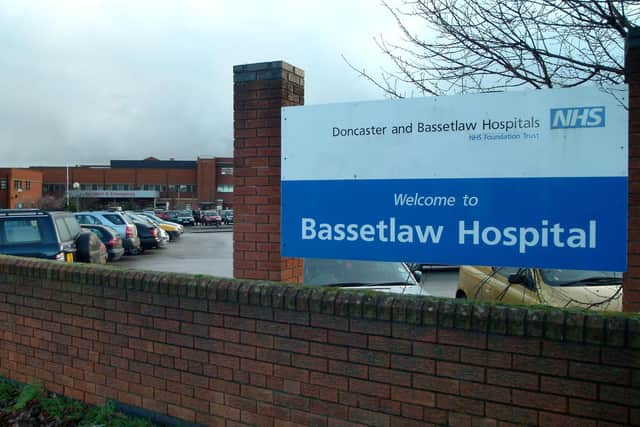Disabled staff at Doncaster and Bassetlaw Hospitals Trust almost twice as likely to experience bullying from manager
and live on Freeview channel 276
Disability equality charity Scope said the figures are ‘deplorable’, and urged the Government to strengthen its Disability Confident scheme – which employers enlist in to improve access and working conditions for disabled staff – and better protect disabled workers' rights.
The NHS England figures, which have just been released, come from the NHS staff survey conducted in autumn 2021.
Advertisement
Hide AdAdvertisement
Hide AdThey show 14.9 per cent of disabled staff at DBTH experienced bullying, harassment or abuse in the previous 12 months.


This fell to 7.4 per cent of non-disabled staff, meaning disabled employees were twice as likely to experience harassment.
Across England, 16.4 per cent of disabled staff said they had experienced harassment, bullying or abuse from a manager – 1.7 times more likely than non-disabled employees.
Thomas Hamilton-Shaw, policy manager at Scope, said: "It’s deplorable that disabled people are more likely to experience bullying from colleagues and abuse from the public.
Advertisement
Hide AdAdvertisement
Hide Ad"Our public sector should be leading the way when it comes to disability employment.
"For too long it’s been too hard for disabled people to get into work, stay in work and thrive in work – this needs to change."
The figures also show 26.5 per cent of disabled staff at DBTH said they experienced harassment, bullying or abuse from other colleagues in the last 12 months – higher than the 14.4 per cent of their non-disabled colleagues.
Similarly, disabled employees were more likely to be abused by the public, with 34 per cent reporting at least one instance in the last year, compared to 26.4 per cent of non-disabled staff.
Advertisement
Hide AdAdvertisement
Hide AdMr Hamilton-Shaw said the Government must address this by strengthening the Disability Confident scheme so employers ‘actually improve conditions on the ground’, and increase funding for the Equalities and Human Rights Commissions to better protect disabled workers.
He also urged employers to ‘actively improve their working environment’, including implementing reverse mentor schemes for senior and mid-level employees.
Zoe Lintin, chief people officer at (DBTH) said: “It is unacceptable for anybody to experience bullying and harassment at work.
“At DBTH we have an unwavering commitment to our ‘we care’ values, and at the heart of our values is the belief that ‘everybody counts’.
Advertisement
Hide AdAdvertisement
Hide Ad“We have been working hard to embed an inclusive culture where all colleagues feel they belong and feel valued.
"In the last year we have launched an ability staff network and extended our reciprocal mentoring programme to ensure the voices of our disabled colleagues are listened to throughout the trust, introduced discussions in appraisals to ensure leaders address inclusion and belonging and made good progress on flexible working which will help to support disabled colleagues.
"We are also an accredited Disability Confident employer.
“Our equality, diversity and inclusion improvement plan outlines the actions we will take to continue to address any inequalities and improve the experiences at work of colleagues with protected characteristics, including those with a disability.”